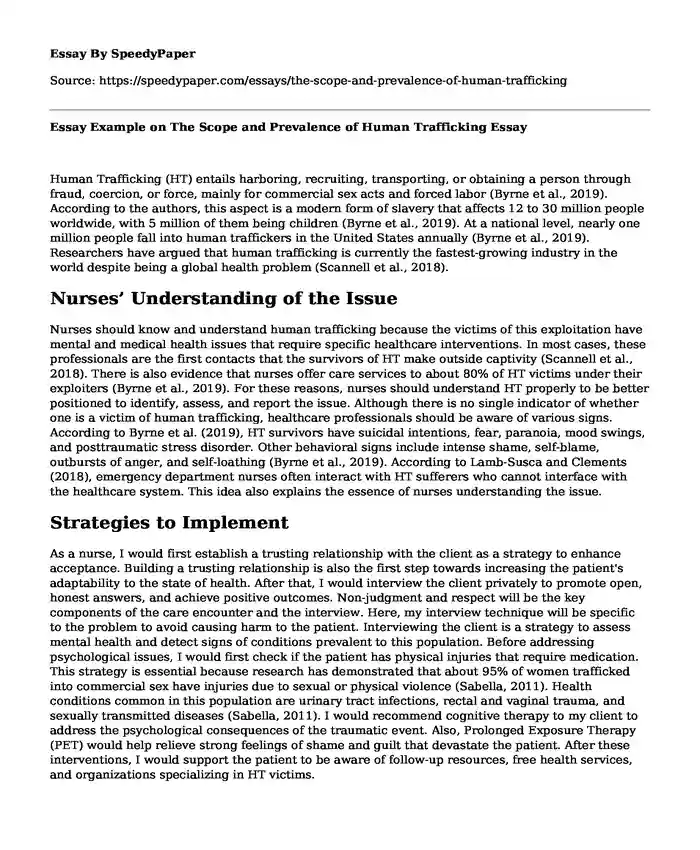
| Type of paper: | Essay |
| Categories: | Nursing Human trafficking Social issue |
| Pages: | 3 |
| Wordcount: | 646 words |
Human Trafficking (HT) entails harboring, recruiting, transporting, or obtaining a person through fraud, coercion, or force, mainly for commercial sex acts and forced labor (Byrne et al., 2019). According to the authors, this aspect is a modern form of slavery that affects 12 to 30 million people worldwide, with 5 million of them being children (Byrne et al., 2019). At a national level, nearly one million people fall into human traffickers in the United States annually (Byrne et al., 2019). Researchers have argued that human trafficking is currently the fastest-growing industry in the world despite being a global health problem (Scannell et al., 2018).
Nurses’ Understanding of the Issue
Nurses should know and understand human trafficking because the victims of this exploitation have mental and medical health issues that require specific healthcare interventions. In most cases, these professionals are the first contacts that the survivors of HT make outside captivity (Scannell et al., 2018). There is also evidence that nurses offer care services to about 80% of HT victims under their exploiters (Byrne et al., 2019). For these reasons, nurses should understand HT properly to be better positioned to identify, assess, and report the issue. Although there is no single indicator of whether one is a victim of human trafficking, healthcare professionals should be aware of various signs. According to Byrne et al. (2019), HT survivors have suicidal intentions, fear, paranoia, mood swings, and posttraumatic stress disorder. Other behavioral signs include intense shame, self-blame, outbursts of anger, and self-loathing (Byrne et al., 2019). According to Lamb-Susca and Clements (2018), emergency department nurses often interact with HT sufferers who cannot interface with the healthcare system. This idea also explains the essence of nurses understanding the issue.
Strategies to Implement
As a nurse, I would first establish a trusting relationship with the client as a strategy to enhance acceptance. Building a trusting relationship is also the first step towards increasing the patient's adaptability to the state of health. After that, I would interview the client privately to promote open, honest answers, and achieve positive outcomes. Non-judgment and respect will be the key components of the care encounter and the interview. Here, my interview technique will be specific to the problem to avoid causing harm to the patient. Interviewing the client is a strategy to assess mental health and detect signs of conditions prevalent to this population. Before addressing psychological issues, I would first check if the patient has physical injuries that require medication. This strategy is essential because research has demonstrated that about 95% of women trafficked into commercial sex have injuries due to sexual or physical violence (Sabella, 2011). Health conditions common in this population are urinary tract infections, rectal and vaginal trauma, and sexually transmitted diseases (Sabella, 2011). I would recommend cognitive therapy to my client to address the psychological consequences of the traumatic event. Also, Prolonged Exposure Therapy (PET) would help relieve strong feelings of shame and guilt that devastate the patient. After these interventions, I would support the patient to be aware of follow-up resources, free health services, and organizations specializing in HT victims.
Questions
- Can victims of HT claim compensation from the human traffickers?
- Which criteria does Homeland Security use to define minors as victims of human trafficking crime?
- If a doctor recommends mental treatment to the victim of HT, what will be the implementation?
References
Byrne, M., Parsh, S., & Parsh, B. (2019). Human trafficking: Impact, identification, and intervention. Nursing Management, 50(8), 18-24. https://doi.org/10.1097/01.numa.0000575304.15432.07
Lamb-Susca, L., & Clements, P. T. (2018). The intersection of human trafficking and the emergency department. Journal of Emergency Nursing, 44(6), 563-569. https://doi.org/10.1016/j.jen.2018.06.001
Sabella, D. (2011). The role of the nurse in combating human trafficking. American Journal of Nursing, 111(2), 28-37. https://doi.org/10.1097/01.naj.0000394289.55577.b6
Scannell, M., MacDonald, A. E., Berger, A., & Boyer, N. (2018). Human trafficking: How nurses can make a difference. Journal of Forensic Nursing, 14(2), 117-121. https://doi.org/10.1097/jfn.0000000000000203
Cite this page
Essay Example on The Scope and Prevalence of Human Trafficking. (2023, Nov 24). Retrieved from https://speedypaper.net/essays/the-scope-and-prevalence-of-human-trafficking
Request Removal
If you are the original author of this essay and no longer wish to have it published on the SpeedyPaper website, please click below to request its removal:
- Free Essay Sample: Information Recall and Eyewitness Testimony
- Free Research Paper Sample: Medicinal Marijuana and the Baby Boomers Generation
- Free Essay Sample: Sex Trafficking Needs Assessment
- Essay Sample on Minimum Federal Wage
- The Harvest of Empire. Paper Example
- Paper Example. DACA, TPS, and Modern Slavery
- Effective Nursing Communication Strategies - Free Essay
Popular categories




